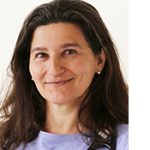A number of department of medicine researchers have been awarded funding through the 2020 MSFHR Convening and Collaborating (C2) and Reach competitions.
The MSFHR Reach Program is designed to bring together researchers and research users to support the dissemination of research evidence, within the context of related knowledge, to facilitate its effective uptake and potential to impact health and care.
In 2020, the MSFHR Reach Award recipients from the UBC department of medicine are:
 Thalia Field, Co-Lead (Division of Neurology) and team have been awarded the MSFHR Reach Award for 2020.
Thalia Field, Co-Lead (Division of Neurology) and team have been awarded the MSFHR Reach Award for 2020.
Host Institute: University of British Columbia
Project Title: CoBrA Community Brain Art initiative: Co-created brain health promotion with the Downtown Eastside community
Brain disorders are underappreciated, modifiable drivers of daily challenges. Our team’s research includes the ten-year observational Hotel Study, which engages Downtown Eastside (DTES) residents affected by precarious housing, and has found high rates and significant consequences of traumatic brain injury, stroke and mental illness. To engage the community during the COVID-19 pandemic, innovative knowledge dissemination activities are needed. The two-part Community Brain Art (CoBrA) initiative is co-created with residents, healthcare providers and researchers in the DTES. CoBrA aims to share local brain health research and community resources with DTES residents. First, we will co-design art kits with knowledge users, containing art supplies and brain health infographics. These kits will be distributed to residents to facilitate dialogue and visual expression of their experiences with brain wellness and injury. Submitted art and health resources will be shared on our website. Second, we will co-produce a mural with local artists to convey brain health recommendations. Reach and effectiveness will be assessed by kit participation, website access and pre-and post-engagement surveys by text message and peer-facilitated sessions.
 Janessa Laskin, Co-Lead (Division of Medical Oncology) and team have been awarded the MSFHR Reach Award for 2020.
Janessa Laskin, Co-Lead (Division of Medical Oncology) and team have been awarded the MSFHR Reach Award for 2020.
Host Institute: BC Cancer
Project Title: Creative Knowledge Translation To Support BCC’s Personalized OncoGenomics Program
The Personalized Oncogenomics (POG) program at BCC is a patient-driven clinical research project which uses genome sequencing to inform cancer treatment and care. Delivery of the POG program involves a diverse group of stakeholders, all with varying health literacy levels. To close the literacy gap, POG must explore new knowledge translation channels to improve health literacy and education.
Knowledge translation is becoming increasingly common in clinical practice. Best practices recommend the use of lay language and to present material in popular, engaging and creative formats such as video and online content to reach and engage a large audience. Research suggests one of the most effective methods is through animated videos (Meppelink et al., 2015; George et al., 2013).
The goal for this project is to develop a short, patient- and public-focused animated video about the POG program and to showcase the video to our knowledge users in a web-based format. Outcomes include improved awareness about the POG program, improved health literacy for patients considering POG or healthcare professionals new to POG, and improved understanding of how POG supports and enhances patient care in BC.
The MSFHR C2 program is designed to bring together researchers and research users to co-develop research aligned with B.C.’s health system priorities. These collaborations increase the likelihood that research findings will be relevant to users.
In 2020, the MSFHR C2 award recipients from the UBC department of medicine are:
 Julie Robillard, Researcher Co-Lead (Division of Neurology) and team have been awarded the MSFHR C2 Award for 2020.
Julie Robillard, Researcher Co-Lead (Division of Neurology) and team have been awarded the MSFHR C2 Award for 2020.
Host Institute: University of British Columbia
Project Title: Patient-Centered Development of a Research Program on Social Robotics for Pediatric Anxiety
Could a social robot — a small robotic character or pet — be helpful to children living with anxiety? For this project, we will work with children and families to imagine the future of robotics for children’s mental health and learn about what useful social robotics for children could look like in British Columbia. Studies have shown that children are highly receptive to potential robotic interventions and are likely to be accepting of them as tools to improve their health. However, social robots are often developed according to engineer- and expert-driven priorities, rather than in consultation with end-user families.
In the proposed work, we will hold a series of three workshops with families with a lived experience of childhood anxiety in order to identify the most pressing research questions when it comes to pediatric mental health and social robotics. We will also learn from these families what outcomes are most important to them. The overall goal of this work is to understand what would make a robotic intervention helpful and meaningful to families.
 Renelle Myers, Research User Co-Lead (Division of Respiratory Medicine) and team have been awarded the MSFHR C2 Award for 2020
Renelle Myers, Research User Co-Lead (Division of Respiratory Medicine) and team have been awarded the MSFHR C2 Award for 2020
Host Institute: BC Cancer
Project Title: AIRWISE – A Risk Communication Strategy For The Prevention And Early Detection Of Respiratory Illness
Respiratory illnesses, such as asthma, chronic obstructive pulmonary disease, and lung cancer account for the leading causes of preventable deaths in British Columbia. Scientists can now identify people who are at a high risk of developing these devastating illnesses early on when it is possible to prevent, cure or slow the progression of disease. Prevention and early detection programs, however, don’t reach all members of the population equally. In addition, environmental radon and air pollution increase the risk of developing respiratory illnesses for people living in some areas of the province. This study is motivated by the need to expand the reach of prevention and early detection programs through risk communication. Our experienced team of researchers, community stakeholders, trainees, and knowledge translation specialists will define the risk information that is needed for future research and for communicating in clinical and community-based settings. Together, we will convene an advisory committee to design the first version of the AIRWISE risk communication platform and establish community coalitions to evaluate and implement it.